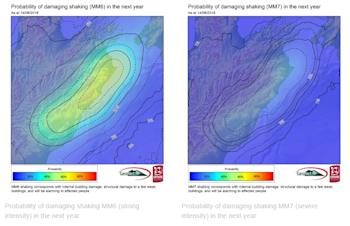
Why do we make earthquake forecasts?
GNS Science has been producing earthquake forecasts since the late 1990s, but it wasn’t until the 2010/11 Canterbury earthquakes that people really took notice of them.
The past decade has shown that earthquake forecasts can be useful in a number of areas including social science research, engineers, emergency managers, insurance organisations as well as by those who look after infrastructure like our roads, water, power and communications.
Like everyone else, infrastructure and emergency managers only have so much time and resources, so knowing what is likely (or not) to happen helps them decide where to focus their efforts and what sorts of things they may need to plan for, like the possibility of more landslides while fixing a road.
Earthquake forecast probabilities were fed into new building standards after the Canterbury earthquakes, so that new buildings were more resilient to earthquakes in the future. These probabilities are also used by insurance companies to compare risks from different hazards, like flooding and storms.
All our information is freely available. This means our the forecasts are all available on the GeoNet website. We’ll often write a short article when we update a forecast to explain what they mean and what has changed since we put out the previous one. In addition to an article, we often give a list of ‘scenarios’ or explanations to our forecasts that includes detailed description of the region, discussion of faults and relevant historical events.
We know some people like to get earthquake forecasts so that they know what to expect over the coming months or years. And whether people understand the science behind it, we hope they are reassured that people do understand what is happening and that it is within the general range of what is normal. But we also know that some people have just had enough of earthquakes and don’t want to know - we get that.
For most of us, having a general indication of what we can expect to happen over the next few weeks or months – knowing what we should and shouldn’t be surprised by – is useful.
Whatever the forecast, knowing your neighbours and taking a few minutes to work out what you would do with no power, communications or transport for a few days will make a big difference to how your community will cope after an earthquake, or any emergency. There are some great ideas at happens.nz.
This was the last article in our three-part series on earthquake forecasting and predictions. Go here to read our first and second articles.
Attributable to Matt Gerstenberger Seismologist, GNS Science.

